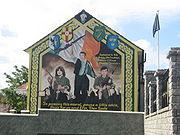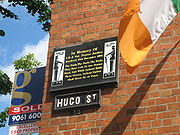
Pearse Jordan
Encyclopedia

Provisional Irish Republican Army
The Provisional Irish Republican Army is an Irish republican paramilitary organisation whose aim was to remove Northern Ireland from the United Kingdom and bring about a socialist republic within a united Ireland by force of arms and political persuasion...
(IRA) volunteer
Volunteer (Irish republican)
Volunteer, often abbreviated Vol., is a term used by a number of Irish republican paramilitary organisations to describe their members. Among these have been the various forms of the Irish Republican Army and the Irish National Liberation Army...
killed whilst unarmed, by a Royal Ulster Constabulary
Royal Ulster Constabulary
The Royal Ulster Constabulary was the name of the police force in Northern Ireland from 1922 to 2000. Following the awarding of the George Cross in 2000, it was subsequently known as the Royal Ulster Constabulary GC. It was founded on 1 June 1922 out of the Royal Irish Constabulary...
officer. In 2001 the European Court of Human Rights
European Court of Human Rights
The European Court of Human Rights in Strasbourg is a supra-national court established by the European Convention on Human Rights and hears complaints that a contracting state has violated the human rights enshrined in the Convention and its protocols. Complaints can be brought by individuals or...
ordered the British Government
United Kingdom
The United Kingdom of Great Britain and Northern IrelandIn the United Kingdom and Dependencies, other languages have been officially recognised as legitimate autochthonous languages under the European Charter for Regional or Minority Languages...
to pay fines to the families of several IRA men, including Jordan's, after holding that the men's human rights
Human rights
Human rights are "commonly understood as inalienable fundamental rights to which a person is inherently entitled simply because she or he is a human being." Human rights are thus conceived as universal and egalitarian . These rights may exist as natural rights or as legal rights, in both national...
were violated by flawed inquest
Inquest
Inquests in England and Wales are held into sudden and unexplained deaths and also into the circumstances of discovery of a certain class of valuable artefacts known as "treasure trove"...
procedures. Following this judgement, British law regarding inquests was changed.
Background
Jordan was born in the lower Falls Road area of BelfastBelfast
Belfast is the capital of and largest city in Northern Ireland. By population, it is the 14th biggest city in the United Kingdom and second biggest on the island of Ireland . It is the seat of the devolved government and legislative Northern Ireland Assembly...
, Northern Ireland
Northern Ireland
Northern Ireland is one of the four countries of the United Kingdom. Situated in the north-east of the island of Ireland, it shares a border with the Republic of Ireland to the south and west...
. When he was six months old, during the time of the Falls Curfew
Falls Curfew
The Falls Curfew was a British Army operation during 3–5 July 1970 in an area along the Falls Road in Belfast, Northern Ireland. The operation started with a weapons search but quickly developed into rioting and gun battles between British soldiers and the Official Irish Republican Army...
, when many streets were barricaded and there were frequent riots, he almost died from the effects of CS gas
CS gas
2-chlorobenzalmalononitrile is the defining component of a "tear gas" commonly referred to as CS gas, which is used as a riot control agent...
during an army operation. A neighbour rushed the unconscious Jordan to hospital. Jordan suffered from the side effects of this for the remainder of his life. Soon after this incident the family moved to Roden Street and later to the New Barnsley area.
Jordan was educated at St Aidan's Primary School and St Thomas' Secondary School. After leaving school he joined his family in the catering trade.
Circumstances of death
The circumstances surrounding Jordan's death are disputed. It is undisputed that in the afternoon of 25 November 1992, at between 3 and 6pm, Jordan was driving a car in Belfast. Whilst on Falls Road his car was forcefully brought to a halt by an unmarked policeRoyal Ulster Constabulary
The Royal Ulster Constabulary was the name of the police force in Northern Ireland from 1922 to 2000. Following the awarding of the George Cross in 2000, it was subsequently known as the Royal Ulster Constabulary GC. It was founded on 1 June 1922 out of the Royal Irish Constabulary...
car. The car was disguised, but all of the occupants were in full Police uniforms. Jordan then abandoned his car, and was subsequently shot three times from behind by Sergeant A, an unnamed member of an Royal Ulster Constabulary
Royal Ulster Constabulary
The Royal Ulster Constabulary was the name of the police force in Northern Ireland from 1922 to 2000. Following the awarding of the George Cross in 2000, it was subsequently known as the Royal Ulster Constabulary GC. It was founded on 1 June 1922 out of the Royal Irish Constabulary...
(RUC) Headquarters Mobile Support Unit
Headquarters Mobile Support Unit
The Headquarters Mobile Support Unit was a detachment of the Royal Ulster Constabulary, now re-named the Police Service of Northern Ireland .-Background:...
, whose members were specially trained in counter-terrorism
Counter-terrorism
Counter-terrorism is the practices, tactics, techniques, and strategies that governments, militaries, police departments and corporations adopt to prevent or in response to terrorist threats and/or acts, both real and imputed.The tactic of terrorism is available to insurgents and governments...
.
Jordan was fatally wounded from the shots and he died a short distance from where his car had been abandoned. The post-mortem report noted a bruise on Jordan's face and shin. No guns, ammunition, explosives, masks or gloves were found in the car, and Jordan had been unarmed. The shooting was witnessed by four civilians and several police officers.
Sergeant A stated, that the officers believed Jordan was transporting weapons for the Provisional Irish Republican Army
Provisional Irish Republican Army
The Provisional Irish Republican Army is an Irish republican paramilitary organisation whose aim was to remove Northern Ireland from the United Kingdom and bring about a socialist republic within a united Ireland by force of arms and political persuasion...
. Sergeant A also stated that his team signalled to Jordan several times for him to pull over, but that Jordan accelerated instead, reaching 60-70 mph. They pursued him and nudged his car to a halt. Their siren was on throughout the chase. Jordan had left his car and was running away. In the meantime a second crew arrived on the scene. Sergeant A gave Jordan a warning shout, ordering him to stop. The other police officers were shouting as well. Jordan turned towards the sergeant in an aggressive manner. His arms were down and his hands out of sight; the sergeant's vision was obscured either by his own car or the other crew's. He feared Jordan was armed and posing a threat to the sergeant's life. He was certain there were no viable alternative, and fired at Jordan, who fell over. According to the members of the other crew, as they arrived on the scene and were stopping their car, Jordan either ran into them or their car struck him, bumping him.
The four civilian witnesses stated that after Jordan's car had been rammed and brought to a stop, he then emerged from the car, shaken, and staggered across the road towards them, followed by police officers. An officer about twelve feet away fired a number of shots, striking Jordan. No warning was issued by any of the officers. There had been nothing threatening in Jordan's actions. When the officers caught up with him, they verbally abused him, and pushed his face into the ground, where he was kicked and searched. The civilians had an unobstructed view of the scene from across the road. Jordan's family, as well as an Amnesty International
Amnesty International
Amnesty International is an international non-governmental organisation whose stated mission is "to conduct research and generate action to prevent and end grave abuses of human rights, and to demand justice for those whose rights have been violated."Following a publication of Peter Benenson's...
report, suggest that the incident might have been a pre-planned operation to kill rather than arrest Jordan.
Inquest

Director of Public Prosecutions
The Director of Public Prosecutions is the officer charged with the prosecution of criminal offences in several criminal jurisdictions around the world...
deemed the case inadmissible on the basis of insufficient evidence.
Pearse Jordan's inquest is currently adjourned pending full disclosure of relevant material from the state.
The European Court of Human Rights
In May 2001, Jordan's case was heard by the European Court of Human RightsEuropean Court of Human Rights
The European Court of Human Rights in Strasbourg is a supra-national court established by the European Convention on Human Rights and hears complaints that a contracting state has violated the human rights enshrined in the Convention and its protocols. Complaints can be brought by individuals or...
along with three similar cases. The Court agreed that Jordan's death was in violation of Article 2 of the European Convention on Human Rights
European Convention on Human Rights
The Convention for the Protection of Human Rights and Fundamental Freedoms is an international treaty to protect human rights and fundamental freedoms in Europe. Drafted in 1950 by the then newly formed Council of Europe, the convention entered into force on 3 September 1953...
, a section of which reads: "Everyone's right to life shall be protected by law. No one shall be deprived of his life intentionally save in the execution of a sentence of a court following his conviction of a crime for which this penalty is provided by law."
At the High Court, counsel for the Jordan family argued that the Secretary of State
Secretary of State (United Kingdom)
In the United Kingdom, a Secretary of State is a Cabinet Minister in charge of a Government Department ....
was in continued breach of Article 2 of the European Convention on Human Rights by failing to properly investigate Jordan's killing. The counsel also stated that the British government is still in breach of European law, and he called upon the Court of Appeal to issue a declaration that such a breach exists, along with an 'order of mandamus' to instruct immediate corrective action from the Secretary of State.
Counsel for the Secretary of State argued that the inquest system is the way in which Article 2 is complied with by the state.
Song
The circumstances of Jordan's death are recounted in the Irish rebel/Republican songIrish rebel music
Irish rebel music is a subgenre of Irish folk music, with much the same instrumentation, but with lyrics predominantly concerned with Irish republicanism.-History:...
'Pearse Jordan' written & recorded by The Irish Brigade. The recurring phrase "Slán go fóill mo chara" - the song is otherwise in English - in Irish means "Goodbye, my friend".
External links
- Amnesty International. May 4, 2001. "United Kingdom: Landmark judgement on killings in Northern Ireland". Public Statement. Amnesty International Online>Home>Library>Europe and Central Asia>Western Europe>UK. http://web.amnesty.org/library/Index/ENGEUR450102001?open&of=ENG-GBR. Accessed 14 March 2007.
- Amnesty International declares the judgements of the European Court of Human Rights in the cases of Jordan et al. "landmark judgements".
- BBC News. July 9, 2002. "IRA family sue top judge". http://news.bbc.co.uk/1/hi/northern_ireland/2118003.stm. Accessed 14 March 2007.
- In 2002 the Jordan family sued the Lord Chief Justice for breach of the Human Rights Act. It was the first case in which judicial officials were personally sued under this act.
- Friel, Laura. September 7, 2006. "Insult to Injury". An Phoblacht. http://www.anphoblacht.com/news/detail/15836. Accessed 14 March 2007.
- Pearse Jordan.
- MacDabhaid, Pádraig. October 14, 1999. "Who killed our loved ones?". An Phoblacht. http://republican-news.org/archive/1999/October14/14rela.html. Accessed 14 March 2007.
- Pearse Jordan's parents, Hugh and Teresa Jordan.
- McNally, Maire. "Pearse Jordan" (song). GaryOg.com. http://www.garyog.com/lyrics/lyrics.php?song=pearse.jordan. Accessed 15 March 2007.
- The lyrics of the Irish rebel song "Pearse Jordan", by Maire McNally, recounting the circumstances of Jordan's death.

